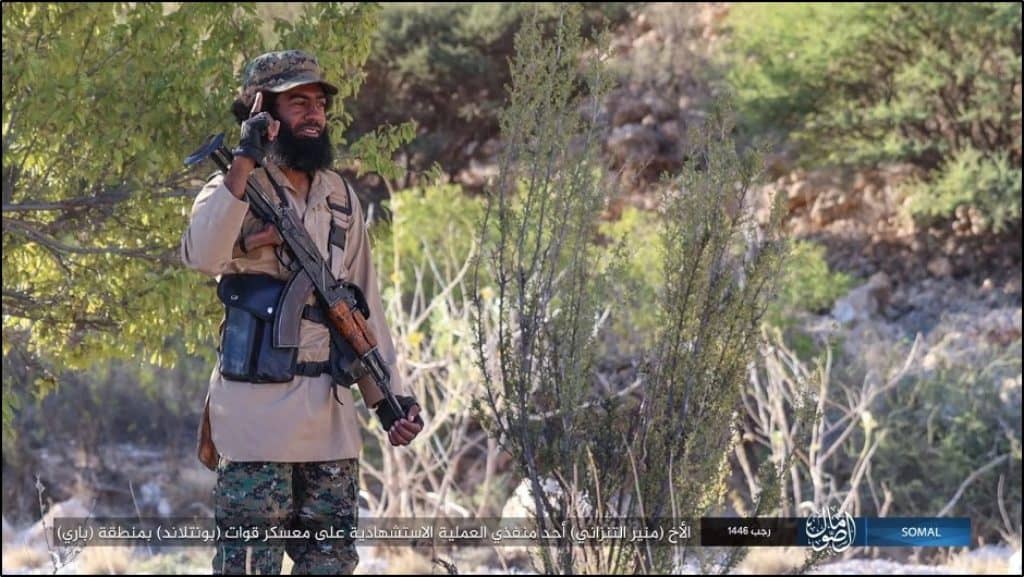
A day after the Islamic State Somalia’s (ISS) brazen suicide assault against a Puntland military base—its most audacious attack to date in Somalia—the jihadist group released images of the men it said perpetrated the strike. All 12 individuals were foreign fighters, with no native Somalis taking part. The group named the majority of the attackers as Tanzanians, followed by Moroccans and Saudis, and then men from Libya, Tunisia, Yemen, and Ethiopia. These identities show the growing internationalization of the Islamic State’s Somalia chapter.
The ISS undertook a major suicide assault against a Puntland Security Forces (PSF) base yesterday, where the PSF had been staging military assets for an upcoming offensive against ISS and its rival, Al Qaeda’s Shabaab. Using two suicide car bombs and at least four individual suicide bombers, the attack was ISS’s biggest to date.
Casualty numbers are still murky. The PSF was initially thought to have lost at least four soldiers, but subsequent reports indicate 18 Puntland soldiers were killed and 30 injured. For its part, the Islamic State said its men killed 22 soldiers.
In its claim of responsibility for the attack, the Islamic State noted that ISS began the assault with two suicide car bombs on two nearby PSF positions, in which one suicide car bomb included a third individual mounting an attached machine gun to the vehicle. The first suicide car bombing was perpetrated by a Moroccan, while a Saudi national conducted the second, according to the Islamic State.
As part of fighting within the bases, the Islamic State said that “several” of its men then detonated their explosive vests. This claim matches local reporting indicating at least four of the attackers detonated themselves. The remaining attackers were then killed in combat—some hand-to-hand—by the PSF.
The fact that all of the combatants in the assault were foreign fighters is unsurprising. ISS has grown its ranks in recent years by primarily recruiting foreigners. These efforts include many recruits from East Africa, including Tanzanians and Ethiopians, and fighters from northern Africa and the Middle East. Tanzanians, Ethiopians, Yemenis, and Sudanese make up most of the group’s ranks, while native Somalis occupy top officer positions.
ISS also has large numbers of fighters from Morocco, Libya, and Tunisia (likely due to the Islamic State’s fortunes waning in North Africa), as well as from Uganda and Syria, with smaller numbers of foreigners also reported from Israel, Palestine, Kenya, the Democratic Republic of the Congo, and Malawi. Other nationalities are also likely present within the group.
Names and nationalities of the fighters who participated in yesterday’s assault
According to the Islamic State’s propaganda, the following is a list of the kunyas [noms de guerre] and nationalities of the fighters who took part in the Puntland assault.
Those specifically stated to have been suicide bombers:
- Abu Anis al Maghribi (Moroccan)
- Qatada al Jazrawi (Saudi)
- Munir al Tanzani (Tanzanian)
Those stated to have taken part in the assault as inghimasi [suicide commandos]:
- Abu al Bara al Maghribi (Moroccan)
- Nabhan al Tanzani (Tanzanian)
- Julaybib al Libi (Libyan)
- Abu al Zubair al Tunisi (Tunisian)
- Mujahid al Tanzani (Tanzanian)
- Battar al Yemeni (Yemeni)
- Abu al Walid al Ethiobi (Ethiopian)
- Julaybib al Jazrawi (Saudi)
- Abu Ibrahim al Tanzani (Tanzanian)







